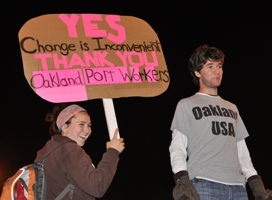Port Actions Spark Debate

Cameron Williams, president of Local 19 in Seattle, said, “It’s kind of like if I planned a party at your house and didn’t ask about it.”
“The occupiers have been understandably confused by mixed signals from individuals in the ILWU,” said Craig Merrilees, communications director for the international. He said some members were speaking to occupiers without backing from the union’s internal democratic process.
Members of the Occupy movement interpreted the union’s distancing itself as, at best, a legal safeguard against fines that could result from a work stoppage. At worst, some saw it as proof of unions’ timidity.
Occupy spokespeople said they reached out to union members after the shutdown call was made. Kari Koch of Occupy Portland said they flyered at shift changes at the port for a week. “We would not be doing this action if we didn’t have any support from the rank and file,” Koch added.
But occupiers didn’t call Portland’s Local 8, she said. (They sent an email.) Occupiers were worried the local could be legally liable if it coordinated with protesters.
“Local 8 officers aren’t in support of it,” said President Jeff Smith days before the protest there. “If it went to a rank-and-file vote I don’t know what would happen.”
President Scott Mason of Local 23 in Tacoma, Washington, said he hadn’t “felt much movement either way” from members.
Samantha Levens, a Bay Area ILWU member, expressed support for the Occupy movement’s goal—to confront corporate power—but not its approach in this action.
She said education and preparation among the members should have been a first priority. She noted that some previous shutdowns took months to prepare, such as a 2008 May Day work stoppage.
Port bosses warned the ILWU that the stoppage against the Iraq and Afghanistan wars was “unauthorized” but members struck anyway.
“The lack of communication with the members leaves the Occupy activists without the benefit of sharing our [earlier] Oakland experience with shutting down the port,” said Levens, who has been active in Oakland general assemblies.
“Because the members had discussed and debated it before they voted on it and had been building support amongst the ranks, the buy-in and ownership of the action was firmly in the hands of the members.”
LABOR DEBATE
ILWU officials were not alone in backing a hands-off attitude. The Alameda Central Labor Council, which includes the Oakland port workers, had a lively debate December 5 when Port Commissioner Victor Uno, who is also an IBEW business manager, moved that the council not endorse the shutdown.

SUPPORT LABOR NOTES
BECOME A MONTHLY DONOR
Give $10 a month or more and get our "Fight the Boss, Build the Union" T-shirt.
The council’s executive committee approved the motion, but many delegates argued that the Occupy movement deserved support or at least labor’s neutrality. The ILWU Local 10 president’s motion to table the non-support motion passed by 75 percent.
Eric Larsen, member relations secretary for AFSCME Local 444 and labor liaison with Occupy Oakland, was barred from addressing the council about the port action.
“I pleaded with them to let me speak,” he said. “They would not.”
He said council leaders said their reason for rejecting him, and for their lack of support for the shutdown, came from Occupy’s failure to communicate.
On December 9 the building trades council took a position against the shutdown.
AIM THE SHOE
While it’s certainly the case that the union movement needs a kick in the pants, and the occupiers have done a lot to aim the shoe, ILWU members and officers say democracy means giving a say to the people affected, not assuming their participation just because an action is righteous.
But Mike Parker, Bay Area activist and co-author of Democracy is Power, said most strikes are inconvenient for someone. Their success relies on all workers affected by an action honoring the line, whether or not they felt appropriately warned.
Other unionists involved in the Occupy movement say the ILWU should recognize how other movements can help them.
“The Occupy movement is simply taking from labor history,” said Robbie Donohoe, an Electrical Workers (IBEW) member who organized for the shutdown. “We’re making it safer for workers to challenge the boundaries of laws that were created to secure the reins of power firmly in the hands of the 1%.”
Parker said the constraints on unions are too great to expect a better process.
“Even if Occupy Oakland were the best, most democratic it could be, there is no way that they could consult with elected leaders of the ILWU,” he said. “Unions are faced with a choice of gambling everything [by openly supporting a strike] or of protecting themselves by disclaiming responsibility and honoring lines by using loopholes.”
It doesn’t help that right-wing courts are the ones deciding whether the union is responsible. “The courts have made it clear they won’t accept a wink,” Parker said.




